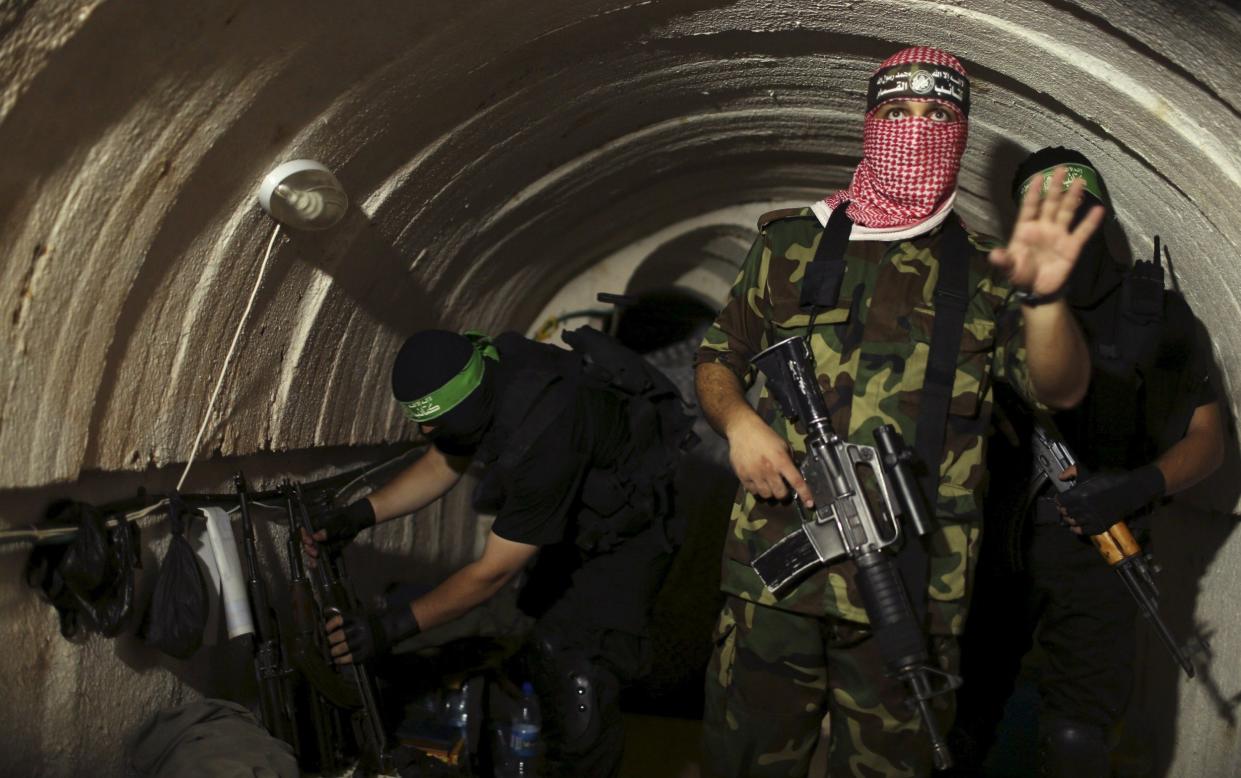The Battle of the Tunnels is about to begin in Gaza

The leaders of Hamas know that once the Israeli counter-offensive starts they will lose their greatest asset: the interconnected tunnels in which their missiles are assembled and taken to launch openings, ready for fire into Israeli territory.
These underground networks have many uses, with everything from weapons drills hidden from overhead balloons or synthetic aperture radars (which produce photo-like images in all degrees of visibility) to makeshift headquarters and even rest areas protected from air strikes.
Built with the cement and rebar donated by the European Union, Qatar and both Islamic and Western charities “to build housing for refugees”, and delivered to Gaza through the Israeli port of Ashdod – Israeli governments that tried to limit the cement imports were barraged with “human rights” demands – the tunnel network has grown exponentially over the past decade. Israeli soldier-analysts even refer to it as “the Underground”, in reference to London’s labyrinthine tube network.
The discovery that Hamas was going all out to build its tunnels was also the start of the Israeli army’s education in the arcane art of finding, conquering and quickly demolishing tunnels .
Its first lesson was that tunnel warfare is not for amateurs, nor even for highly accomplished but generic “commandos” including the top echelon Sayeret Matkal – it requires very specific detection and monitoring skills and gear, ultra close-combat weapons (even compact assault rifles are too long), the use of specialised shields and respirators, as well as the very quick reaction times that all first-rate soldiers require.
Hamas knows from previous experience that the closer the range, the greater is the qualitative gap between their men and first-line Israeli infantry (it was Arik Sharon, who ended up as Prime Minister after a brilliant military career, who first discovered in the 1950s that Israelis had an edge in close combat).
Even in its hyper-successful surprise raids that took full advantage of Israel’s grossly over-confident reliance on high-tech observation towers and absurdly few troops, Hamas lost more than a thousand killed by civilian home guards with their pistols and submachine guns, aided by the handful of soldiers present.
Knowing the odds, Hamas is now doing all it can to delay Israel’s tunnel offensive by releasing hostages in pairs, after lengthy talks for each batch. If the current rate of release – two at a time – continued with 200 more to go, the offensive would be delayed until the following year.
In addition to the excruciating wait, with 360,000 reservists recalled to duty in addition to the 160,000 on active duty (the entire British army numbers 80,360 including the Ghurkas and the US Army 452,689), there is the very practical matter of keeping a great part of Israel’s labour force away from its jobs, and parents away from their families.
At least for those problems, the solution has been found in the very thing that makes Israel so vulnerable: it is a very small country, so that batches of troops released from their unit deployments facing Gaza can be allowed to go home to live and work, yet still be back in hours if called to launch the offensive.
They are certainly not needed now that the defenses are wide awake, with guard units all along the perimeter: where they should have been all along. Overconfidence is an Israeli trait. When the Egyptian army crossed the Suez Canal on October 1973 with tens of thousands of reservists, just 411 Israeli reservists were holding 17 Canal-side forts.
The intensely frustrating delay in launching the offensive does not preclude all offensive action. Both the Israeli Army and the Shin Bet security service have units of skilled individual fighters who speak perfect Palestinian-accented Arabic. With all the confusion caused by the bombing, they have been able to blend in inside the in order to look for Hamas leaders. So far the names of 18 Hamas commanders and political chiefs successfully killed have been published, with the mini-campaign set to continue.
The Hezbollah shi’a army across the Lebanese border, with its estimated massive supply of 150,000 rockets (for context, the total launched from the Gaza Strip is under 8,000) that could quickly overwhelm Iron Dome’s capabilities, has so far refrained from backing up its vehement support for Hamas. But there are two exceptions to this non-engagement.
One was a brief bout of machine gun fire which killed a young reservist just arrived from his US family home, with the other being the launch of some rockets by Palestinians harboured in Lebanon.
Hezbollah’s vehement leader Nasrallah and his Iranian paymasters keep calling for Israel’s destruction (along with “death to the USA”), but neither have reacted to Israel’s actual destruction of the freight terminals in the Aleppo and Damascus airports that Iran uses to deliver weapons to Hezbollah.
At this point it is impossible to say if Nasrallah’s plan is to start the rocket barrages when Israel starts its offensive into Gaza, or whether he has another starting point, or whether he is deterred by the vulnerability of his Shi’a supporters in Southern Lebanon to Israel’s artillery, mortars, and airpower – which last time in 2006 left southern Beirut in ruins along with Hezbollah headquarters and barracks.
After that war, Nasrallah, with commendable honesty, declared that he would never have started the war had he known what the Israeli force would do to the houses of his followers (to mitigate their fury, Hezbollah officials went around with bags of US dollars supplied by Iran to pay for some of the damage).
It is not unreasonable to expect that the only leader in the region who does care for his supporters – Hamas gladly sacrifices its followers to its cause – will not expose them to another devastating bombing campaign, just to launch rockets against Israel. For now, the conflict is focused on Hamas. If Israel concentrates its efforts on destroying Gazan tunnels, they’ll find themselves almost totally powerless.

